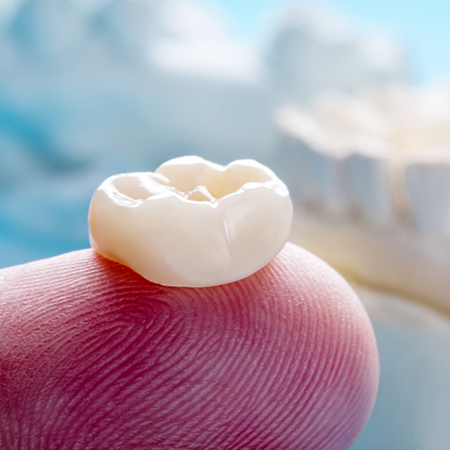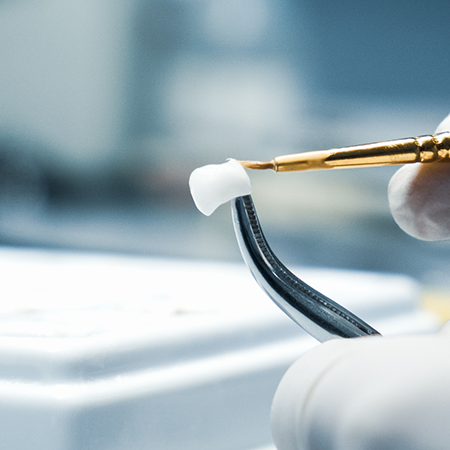Dental Crowns Allen
Renew Your Smile’s Strength and Beauty

In an ideal world, everyone’s natural teeth would remain healthy and whole for a lifetime. Unfortunately, though, decay, trauma, or infection may cause severe damage. In such circumstances, a dental crown may be the ideal restorative treatment. These custom-made prosthetics have the potential to make your smile look, feel, and function like new! This page discusses what dental crowns in Allen are and how Dr. Kar can help you experience their many benefits.
Why Choose Advanced Dental Care of Allen for Dental Crowns?
- High-Quality, Durable Dental Materials Used
- Partnered with Local, Expert Dental Laboratories
- View Our Extensive Smile Gallery
What Is a Dental Crown?

A dental crown is a tooth-shaped cap that fits over the entire visible portion of a tooth (everything above the gum line). Dental crowns may be made of various materials, including porcelain, porcelain fused to metal, and gold. A crown can be used to:
- Restore the shape and function of a broken tooth
- Protect a tooth that has been treated with root canal therapy
- Repair a tooth that is too decayed to be fixed with a regular filling
- Improve the way a tooth looks
- Replace a missing tooth (when used with a dental implant or as part of a dental bridge)
The Process of Getting a Dental Crown

The process for getting a traditional dental crown begins with tooth preparation. Dr. Kar will have to modify your teeth so they will fit well beneath the crown; this usually involves filing the teeth down or filling them in. We use local anesthetic (and sedation in some cases) to make sure patients are comfortable during this part of the process. Once the teeth are prepared, our team will take detailed images and impressions of your mouth. Dr. Kar will use that data to design your restoration. As a prosthodontist, he has an in-depth knowledge of how to create prosthetics that look and function like real teeth, and that will not interfere with your natural bite.
Once Dr. Kar designs your restoration, a dental laboratory will fabricate it according to his specifications. In the meantime, you will wear a temporary restoration to protect your prepared teeth. When your permanent crown is ready, Dr. Kar will verify its fit before he cements it into its designated place.
Dental Crowns FAQs
How do I take care of my dental crown?
Dental crowns only need to be brushed and flossed just like natural teeth to stay healthy for many years. You’ll need to brush twice a day with fluoridated toothpaste and floss at least once a day to remove plaque and food debris from and in between the crown. You’ll also want to avoid biting down on extremely hard or sticky substances as this can cause the crown to crack or come loose. If you grind your teeth, make sure to use a nightguard.
How long do dental crowns last?
It’s not uncommon for dental crowns to last anywhere between 10 and 15 years before needing to be replaced. However, this is only the case if you take proper care of your crown and make sure to perform your oral hygiene routine daily.
Can I still get cavities if I have a crown?
Yes, you can. It is true that the crown itself cannot develop decay because it is made from inorganic material (in most cases porcelain). However, the natural tooth can still develop decay if you don’t practice good oral hygiene. The same is true for traditional bridges, which rely on natural teeth to hold it in place. In these instances, it helps to purchase an interdental toothbrush to keep the underside of crowns and bridges clean.
Does it hurt to receive a dental crown?
Treatment to receive a dental crown does not cause discomfort for one key reason. Dentists will always provide enough local anesthetic to ensure no sensation is felt during the modification of existing tooth enamel and placement. However, you may notice some mild discomfort after the anesthetic wears off. Any tenderness you experience following your treatment can be easily managed with over-the-counter painkillers.
